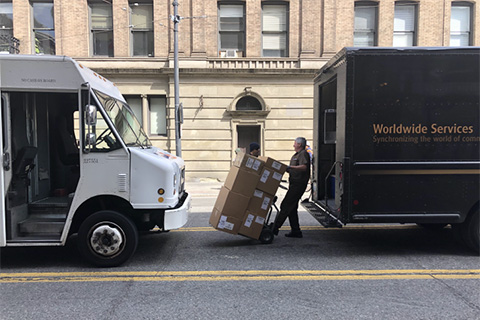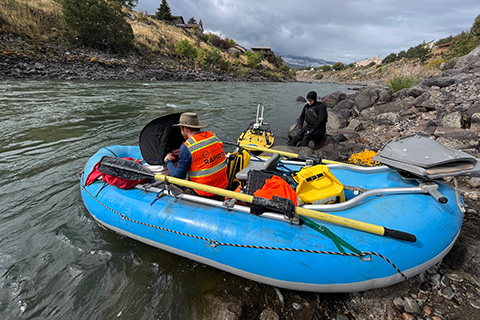May 15, 2023
Project to digitize the curb receives $2 million SMART grant

Freight carriers often have trouble accessing loading zones when making deliveries in downtown Seattle. To help remedy this by “digitizing” the curb, a $2 million U.S. Department of Transportation Strengthening Mobility and Revolutionizing Transportation (SMART) program grant has been awarded to a multi-sector team led by the Seattle Department of Transportation in partnership with CEE’s Urban Freight Lab and Open Mobility Foundation.
“The Urban Freight Lab is delighted to help deliver new digital tools and data-driven solutions to maximize access, safety, mobility and usage of the limited curb space in Seattle,” says Urban Freight Lab Director and Professor Anne Goodchild. “Deploying new strategies and approaches is key to reducing congestion and emissions, and achieving Seattle’s climate and economic goals.”
Although there are more than 5,000 curbside loading zones within the city of Seattle, it can be difficult for delivery drivers to find parking, as spaces may be too small or are already occupied. To streamline curb access and use, with the added benefit of reducing congestion, the project will implement new tools to create a digital representation of the city’s loading zone spaces. This will allow the city to digitally manage commercial loading spaces, analyze activity and communicate with drivers. The strategy will be informed by targeted outreach to local businesses and freight carriers.
The researchers plan to conduct a pilot test in the Belltown and Denny Triangle business districts near downtown Seattle. The project is anticipated to start this summer and extend through early 2025.
Following flooding, RAPID researchers gather data at Yellowstone

The historic flooding that hit Yellowstone National Park in summer 2022 prompted an urgent need to understand the impacts of the natural disaster on both the infrastructure and environment in the ecotourism-dependent community. The UW Natural Hazards Reconnaissance Facility (known as RAPID) responded with a two-phase approach, leveraging cutting-edge technology and expertise to investigate the intricate interdependencies between human-built infrastructure and the natural world.
During the first reconnaissance trip immediately following the flood, RAPID supported fieldwork undertaken by a Geotechnical Extreme Events Reconnaissance (GEER) team by providing laser scanners. These were used to capture structural damage and assess the extent of the flood's impact on the infrastructure and environment. In the second phase, RAPID researchers Michael Grilliot and Andrew Lyda joined the onsite efforts. They operated state-of-the-art equipment including a drone-mounted multispectral camera to investigate the source of deposited sediments and a hydrographic survey vessel to map the river bottom and measure erosion next to bridge foundations. This technology enabled the collection of high-resolution perishable data to better understand how sediment is carried away and deposited in new locations, particularly near affected infrastructure.
The insights gathered from the research will offer a deeper understanding of how the geometry of the river channel, flow conditions, presence and location of debris, and geotechnical properties influence engineered structures from bridges to buildings during extreme floods. With climate change causing more frequent and severe flooding, the insights will be invaluable in updating infrastructure design and flood mitigation strategies across the United States.
PacTrans receives USDOT $15 million renewal award

To continue and expand its important work to improve the movement of people and goods throughout the region, the Pacific Northwest Transportation Consortium (PacTrans) has received another green light: a $15 million renewal grant over the course of five years from the U.S. Department of Transportation (USDOT).
Housed within CEE and directed by Professor Yinhai Wang, PacTrans is one of 10 regional University Transportation Centers (UTC) across the U.S. As the UTC for Federal Region 10, PacTrans represents Washington, Oregon, Idaho and Alaska. In partnership with regional universities, PacTrans supports a variety of transportation research related to advancing mobility, including technology transfer and education and workforce development. The four core university partners are Portland State University, University of Alaska Anchorage, University of Idaho and Washington State University. The Northwest Indian College, which has six campuses in Western Washington, will also serve as an education and outreach partner.
The center will continue to focus on mobility challenges related to the movement of people and goods throughout the region, with the addition of several strategic goals identified by USDOT. The center will work toward two overarching strategic goals: economic strength and global competitiveness. Secondary goals are equity, transformation and safety.
Founded in 2012, PacTrans received a $14 million award from USDOT in 2016. Much of the work of the center has come to fruition in recent years, with the launch of a workforce training program and the start-up company AIWaysion.
New NW TTAP Center launches, seeks assistant director

Housed within CEE, the Northwestern Tribal Technical Assistance Program (NW TTAP) Center launched in November 2022 in collaboration with Eastern Washington University (EWU). The center is one of seven national centers supported by the Federal Highway Administration’s National Tribal Technical Assistance Program and joins an even wider network of 51 local program centers.
The regional centers serve as a local resource for tribal transportation training, technical assistance and technology transfer needs, and also assist with the maintenance, management and administration of transportation infrastructure and programs. The NW TTAP Center supports 45 Native American and Alaskan Native Tribes within the Northwestern Bureau of Indian Affairs Region 6.
Directed by CEE Professor Yinhai Wang in collaboration with Associate Director and EWU faculty Margo Hill, the center is supported by UW graduate students Ollie Wiesner and Olivia Potash. To carry out the day-to-day functions of the program, the center is looking to hire an assistant director. To learn more or apply, visit nwttap.org.
To understand the most pressing transportation needs and challenges associated with each tribe in the region, the center’s leadership and students are in the beginning stages of meeting with each tribe. The center is also building relationships with subject matter experts across all transportation-related disciplines who may be interested in developing trainings or aiding in practical technical assistance. If interested, contact Wiesner at olw8@uw.edu.